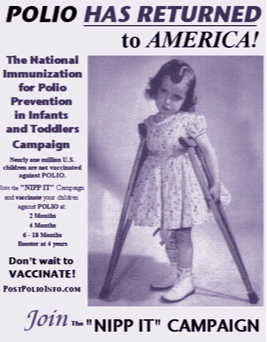
An old anti-polio campaign poster from the 1950's. Polio has been reported in the U.S. for the first time in nearly 10 years.
New York, July 22 (RHC)-- The United States has reported its first case of polio in nearly a decade after health officials in the state of New York said a patient had tested positive for the disease.
The state’s health department said that the case was detected in a resident of Rockland County, about 48 km (30 miles) north of Manhattan. Testing suggested the case of the highly contagious virus may have originated outside of the U.S., the department said in a statement.
“We are monitoring the situation closely and working with the New York State Department of Health and the Centers for Disease Control and Prevention to respond to this emergent public health issue to protect the health and wellbeing of county residents,” Rockland County Health Commissioner Patricia Schnabel Ruppert said.
The person is no longer deemed contagious, but investigators are trying to figure out how the infection occurred and whether others were exposed. Officials also told healthcare providers to be on the lookout for more cases and urged people in the area who are not vaccinated to get the shot.
The last case of polio in the United States was recorded in 2013, according to the Centers for Disease Control and Prevention (CDC). The CDC, which confirmed Thursday’s case, has said no cases of polio have originated in the US since 1979. However, the virus in the past has been brought into the country by travellers with polio.
The last such case was in 2013 when a 7-month-old who had recently moved to the U.S. from India was diagnosed in San Antonio, Texas, according to federal health officials.
Polio was once a very feared disease, with annual outbreaks in the U.S. causing thousands of cases of paralysis. The virus mainly affects children and its symptoms include sore throat, fever, tiredness and nausea, the CDC said.
Vaccines became available starting in 1955, and a national vaccination campaign cut the annual number of U.S. cases to less than 100 in the 1960s and fewer than 10 in the 1970s, according to the CDC.
In 1979, polio was declared eliminated in the U.S., meaning there was no longer routine spread. Most Americans are vaccinated against polio, but the new case should serve as a wake-up call to the unvaccinated, said Jennifer Nuzzo, a Brown University pandemic researcher.
“This isn’t normal. We don’t want to see this,” Nuzzo said. “If you’re vaccinated, it’s not something you need to worry about. But if you haven’t gotten your kids vaccinated, it’s really important that you make sure they’re up to date.”
There are two types of polio vaccines. The U.S. and many other countries use jabs made with an inactivated version of the virus. But some countries where polio has been more of a recent threat use a weakened live virus that is given to children as drops in the mouth. In rare instances, the weakened virus can mutate into a form capable of sparking new outbreaks.
U.S. children are still routinely vaccinated against polio with the inactivated vaccine. Federal officials recommend four doses to be given at set ages from two months through to six years old. According to the CDC’s most recent childhood vaccination data, about 93 percent of 2-year-olds had received at least three doses of polio vaccine.
Polio spreads mostly from person to person or through contaminated water. It can infect a person’s spinal cord, causing paralysis and possibly permanent disability and death. The disease is endemic in Afghanistan and Pakistan, although numerous countries in Africa, the Middle East and Asia have also reported cases in recent years.

